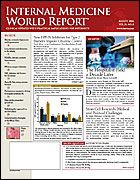Performance Measures Driving In-hospital Antibiotic rx
Chest
Attempts to meet performance measures may be exacerbating antibiotic resistance, producing avoidable side effects, and masking underlying conditions, according to new data published in (2006; 130:16-21).
Investigators sought to determine the appropriateness of the Centers for Medicare & Medicaid Services (CMS) core performance measure that recommends antibiotic therapy for Medicare beneficiaries with pneumonia within 4 hours of their arrival at the hospital.
“With the recent trend in using antibiotic timing and other performance measures as the basis for public reporting and pay-for-performance programs, there is increasing pressure for hospitals and physicians to drive their performance rates as high as possible,” said lead author Mark L. Metersky, MD, FCCP, University of Connecticut School of Medicine, Farmington.
“To achieve 100% performance, physicians may be compelled to give antibiotics before a firm diagnosis can be established,” a practice Dr Metersky refers to as “shoot first and ask questions later.”
Since elderly patients with pneumonia often have atypical symptoms, the medical records of 86 Medicare patients (average age, 79 years) who had been hospitalized with pneumonia were randomly selected for inclusion in the study.
The consensus of 3 independent reviewers was that in 22% (19 of 86) of the cases, there were clinical reasons for delaying antibiotic therapy other than quality of care-all of which were related to diagnostic uncertainty.
Diagnostic uncertainty was the result of either an unusual presentation of pneumonia (eg, no rales, oxygen desaturation, or suggestive radiographic findings) in a patient in whom the presumptive diagnosis was subsequently confirmed or presenting pulmonary symptoms that could have been caused by another condition (eg, heart failure, chronic obstructive pulmonary disease).
For the 19 patients in whom treatment should have been delayed, it would probably have been impossible to make a diagnosis of pneumonia within the 4-hour time frame specified by CMS. “We suggest that the implied performance goal be changed from 100% to the percentage of patients who present in a manner that would not be likely to lead to a delay in diagnosis,” concluded Dr Metersky and colleagues, suggesting a goal of approximately 75% to 80%.
Dr Metersky notes that “CMS has already adapted the performance measure for antibiotic timing to exclude patients with negative chest radiographs, which, more than likely, indicates they do not have pneumonia.” In this study, however, 24% of patients with a diagnosis of pneumonia at hospital discharge had no radiographic findings suggestive of pneumonia.
The president of the American College of Chest Physicians, W. Michael Alberts, MD, FCCP, concluded that “healthcare professionals must continue to work with institutions that are developing performance measures to ensure they are accurately representing clinical patient care.”
